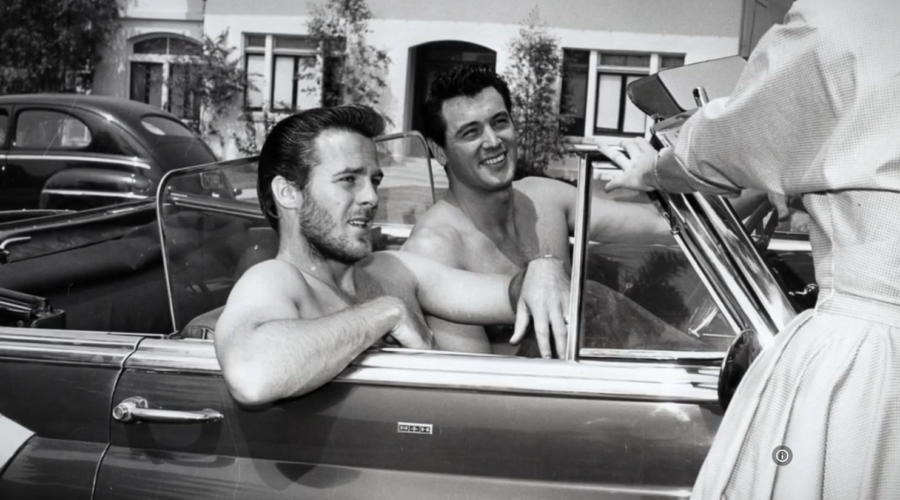For those looking for some head-spinning holiday viewing, Stephen Kijak’s Tribeca-premiering, HBO-streaming Rock Hudson: All That Heaven Allowed is a biopic chockfull of hall of mirrors contradictions: first and foremost it centers on a world-famous, well-adjusted, publicly closeted gay man who proudly (miraculously) lived his truth by hiding in plain sight. Indeed, for over three decades the titular Hollywood heartthrob succeeded in simultaneously abiding by the (straights and closeted folks-only) facade of the studio system that micromanaged his career and media persona – the omertà code unbroken until minutes after Hudson died of AIDS-related complications in 1985 – while unabashedly embracing all the perks naturally afforded an Adonis-hot friend of Dorothy. (You go girl!)
That Hudson lived a full and happy double life is a radical case (though he was also a longtime conservative Republican so perhaps he just couldn’t conceive of the lavender scare coming for him), but that queer euphoria is sufficiently backed up by veteran (music-focused) director Kijak’s (2016’s We Are X, 2010’s Stones in Exile) choice of archival clips – imagery from Hudson’s 30-plus filmography (most notably 1959’s Pillow Talk with Doris Day, in which the actor played a straight character pretending to be gay with a delightful wink), along with home movie footage from his ubiquitous and intimate (often clothing-optional) gatherings; not to mention heartfelt testimonials from several now elderly homosexual men who knew Hudson personally, including Armistead Maupin who first encountered the star as a young, up-and-coming, out-and-proud writer in San Francisco. Maupin in fact claims he’d even patiently tried to coax his dear friend to come out to the public years before his devastating diagnosis. Hudson was listening, he assures, but his boyfriend at the time just wasn’t having it – as he wanted him to wait until after his own mom had passed away. (Which Maupin found baffling: “If I was fucking Rock Hudson, I would want my mother to know immediately.”)
And yet every profession’s greats are skilled in making the near-impossible appear effortless, especially those who earn their pay through the “magic of Hollywood.” In that sense, Kijak’s choice of title is likewise revealing in its nod to Douglas Sirk’s influential 1955 “woman’s picture” starring Hudson and Jane Wyman (who broke her co-star/husband Ronald Reagan’s heart when she filed for divorce in 1948. Of course, Hudson’s close confidante, First Lady Nancy Reagan, would in turn break his heart when she declined the request to help her dying friend get transferred to a Paris hospital. Truth is even sadder than fiction). All That Heaven Allows, one recalls, is the tale of a widow torn between being true to herself (literally following her passion, Hudson’s Ron Kirby) or conforming to society’s expectations for a well-heeled New Englander (i.e., ladies who lunch do not marry their arborists). Ultimately, Wyman’s Cary Scott does indeed choose heart over propriety – though it’s Hudson’s character who arguably has paid the steeper price.
In the end, Rock Hudson: All That Heaven Allowed leaves the viewer with the nagging sense that our American answer to Marcello Mastroianni – what other Golden Age contemporary combined such mischievousness with raw masculinity? – just never got his due. Though he lost to Yul Brynner in The King and I at the 1957 Academy Awards (as did his Giant co-star James Dean, rumored to be bisexual and proven to be insufferable to Hudson), the star probably should have received an Oscar nom for all his other performances too – as every role Hudson took on was a Herculean feat. Not only did the intrepid thesp have to start by code-switching (to the extreme to become the manliest of straight men), but then layer on top of that part whatever character he was asked to play. In fact, it’s downright surprising Hudson didn’t lose his mind after every shoot. Then again, he did have a secret weapon: the preternatural ability to laugh off the joke he was always in on.

